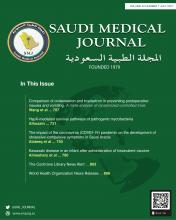Research ArticleOriginal Article
Open Access
Prevalence and determinants of distress among oncology patients at a tertiary care medical city in Riyadh, Saudi Arabia
Luluh Y. Alsughayer, Lamees A. Altamimi, Futoon S. Alsaleh, Lamya Alsaghan, Ibrahim Alfurayh, Nashwa M. Abdel-Aziz, Khalid A. Alsaleh and Fahad D. Alosaimi
Saudi Medical Journal July 2021, 42 (7) 761-768; DOI: https://doi.org/10.15537/smj.2021.42.7.20210121
Luluh Y. Alsughayer
From the College of Medicine (Alsughayer, Altamimi, Alsaleh, Alsaghan); from the Psychiatry Department (Alfuraih, Alosaimi); Hematology-Oncology Center (Abdel-Aziz, Alsaleh), King Saud University, Riyadh, Kingdom of Saudi Arabia; and from the Department of Medical Oncology (Abdel-Aziz), South Egypt Cancer Institute, Assiut University, Assiut, Egypt.
MBBSLamees A. Altamimi
From the College of Medicine (Alsughayer, Altamimi, Alsaleh, Alsaghan); from the Psychiatry Department (Alfuraih, Alosaimi); Hematology-Oncology Center (Abdel-Aziz, Alsaleh), King Saud University, Riyadh, Kingdom of Saudi Arabia; and from the Department of Medical Oncology (Abdel-Aziz), South Egypt Cancer Institute, Assiut University, Assiut, Egypt.
MBBSFutoon S. Alsaleh
From the College of Medicine (Alsughayer, Altamimi, Alsaleh, Alsaghan); from the Psychiatry Department (Alfuraih, Alosaimi); Hematology-Oncology Center (Abdel-Aziz, Alsaleh), King Saud University, Riyadh, Kingdom of Saudi Arabia; and from the Department of Medical Oncology (Abdel-Aziz), South Egypt Cancer Institute, Assiut University, Assiut, Egypt.
MBBSLamya Alsaghan
From the College of Medicine (Alsughayer, Altamimi, Alsaleh, Alsaghan); from the Psychiatry Department (Alfuraih, Alosaimi); Hematology-Oncology Center (Abdel-Aziz, Alsaleh), King Saud University, Riyadh, Kingdom of Saudi Arabia; and from the Department of Medical Oncology (Abdel-Aziz), South Egypt Cancer Institute, Assiut University, Assiut, Egypt.
MBBSIbrahim Alfurayh
From the College of Medicine (Alsughayer, Altamimi, Alsaleh, Alsaghan); from the Psychiatry Department (Alfuraih, Alosaimi); Hematology-Oncology Center (Abdel-Aziz, Alsaleh), King Saud University, Riyadh, Kingdom of Saudi Arabia; and from the Department of Medical Oncology (Abdel-Aziz), South Egypt Cancer Institute, Assiut University, Assiut, Egypt.
MDNashwa M. Abdel-Aziz
From the College of Medicine (Alsughayer, Altamimi, Alsaleh, Alsaghan); from the Psychiatry Department (Alfuraih, Alosaimi); Hematology-Oncology Center (Abdel-Aziz, Alsaleh), King Saud University, Riyadh, Kingdom of Saudi Arabia; and from the Department of Medical Oncology (Abdel-Aziz), South Egypt Cancer Institute, Assiut University, Assiut, Egypt.
MDKhalid A. Alsaleh
From the College of Medicine (Alsughayer, Altamimi, Alsaleh, Alsaghan); from the Psychiatry Department (Alfuraih, Alosaimi); Hematology-Oncology Center (Abdel-Aziz, Alsaleh), King Saud University, Riyadh, Kingdom of Saudi Arabia; and from the Department of Medical Oncology (Abdel-Aziz), South Egypt Cancer Institute, Assiut University, Assiut, Egypt.
MBBS, FRCPCFahad D. Alosaimi
From the College of Medicine (Alsughayer, Altamimi, Alsaleh, Alsaghan); from the Psychiatry Department (Alfuraih, Alosaimi); Hematology-Oncology Center (Abdel-Aziz, Alsaleh), King Saud University, Riyadh, Kingdom of Saudi Arabia; and from the Department of Medical Oncology (Abdel-Aziz), South Egypt Cancer Institute, Assiut University, Assiut, Egypt.
MD
References
- 1.↵
- 2.↵
- 3.↵
- Fallowfield L,
- Ratcliffe D,
- Jenkins V,
- Saul J.
- 4.↵World Health Organization. The International Agency for Research on Cancer (IARC). Global Cancer Statistics 2020. Population Fact Sheets (Saudi Arabia). [Updated 2021 March. Accessed on 2021 February 2]. Available from: https://gco.iarc.fr/today/fact-sheets-populations
- 5.↵
- Alosaimi FD,
- Abdel-Aziz N,
- Alsaleh K,
- AlSheikh R,
- AlSheikh R,
- Abdel-Warith A.
- 6.↵
- AlHadi AN,
- AlAteeq DA,
- Al-Sharif E,
- Bawazeer HM,
- Alanazi H,
- AlShomrani AT, et al.
- 7.↵
- Spitzer RL,
- Kroenke K,
- Williams JB,
- Löwe B.
- 8.↵
- Kroenke K,
- Spitzer RL,
- Williams JB.
- 9.↵
- VanHoose L,
- Black LL,
- Doty K,
- Sabata D,
- Twumasi-Ankrah P,
- Taylor S, et al.
- 10.↵
- Acquati C,
- Kayser K.
- 11.↵
- Carlson LE,
- Waller A,
- Mitchell AJ.
- 12.↵
- 13.↵
- Blenkiron P,
- Brooks A,
- Dearden R,
- McVey J.
- 14.↵
- Herschbach P,
- Keller M,
- Knight L,
- Brandl T,
- Huber B,
- Henrich G, et al.
- 15.↵
- 16.↵
- Chiou YJ,
- Chiu NM,
- Wang LJ,
- Li SH,
- Lee CY,
- Wu MK, et al.
- 17.↵
- Mackenzie LJ,
- Carey ML,
- Sanson-Fisher RW,
- D’Este CA.
- 18.↵
- Hollingworth W,
- Metcalfe C,
- Mancero S,
- Harris S,
- Campbell R,
- Biddle L, et al.
- 19.↵
- Al-Shahri MZ,
- Eldali AM,
- Al-Zahrani O.
- 20.↵
- Khalil A,
- Faheem M,
- Fahim A,
- Innocent H,
- Mansoor Z,
- Rizvi S, et al.
- 21.↵
- 22.↵
- Götz A,
- Kröner A,
- Staudacher D
- 23.↵
- 24.↵
- Linehan K,
- Fennell KM,
- Hughes DL,
- Wilson CJ.
- 25.↵
- 26.↵
- Coyne JC.
- 27.↵
- Kendall J,
- Glaze K,
- Oakland S,
- Hansen J,
- Parry C.
- 28.↵
- Mitchell AJ,
- Lord K,
- Slattery J,
- Grainger L,
- Symonds P.
- 29.↵
- 30.↵
- Almigbal TH,
- Almutairi KM,
- Fu JB,
- Vinluan JM,
- Alhelih E,
- Alonazi WB, et al.
In this issue
Prevalence and determinants of distress among oncology patients at a tertiary care medical city in Riyadh, Saudi Arabia
Luluh Y. Alsughayer, Lamees A. Altamimi, Futoon S. Alsaleh, Lamya Alsaghan, Ibrahim Alfurayh, Nashwa M. Abdel-Aziz, Khalid A. Alsaleh, Fahad D. Alosaimi
Saudi Medical Journal Jul 2021, 42 (7) 761-768; DOI: 10.15537/smj.2021.42.7.20210121
Prevalence and determinants of distress among oncology patients at a tertiary care medical city in Riyadh, Saudi Arabia
Luluh Y. Alsughayer, Lamees A. Altamimi, Futoon S. Alsaleh, Lamya Alsaghan, Ibrahim Alfurayh, Nashwa M. Abdel-Aziz, Khalid A. Alsaleh, Fahad D. Alosaimi
Saudi Medical Journal Jul 2021, 42 (7) 761-768; DOI: 10.15537/smj.2021.42.7.20210121
Jump to section
Related Articles
- No related articles found.
Cited By...
- No citing articles found.





